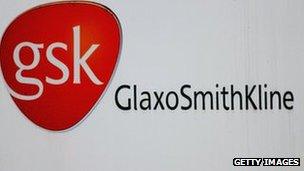GSK's Chinese lesson
- Published
- comments

GSK says it is cooperating with authorities but has denied wrongdoing
GlaxoSmithKline's corporate defence against allegations that its people in China bribed hospitals, doctors and officials is that its board and head-office executives in London knew nothing.
Here is what GSK said about all this yesterday:
"We are deeply concerned and disappointed by these serious allegations of fraudulent behaviour and ethical misconduct by certain individuals at the company and third-party agencies.
"Such behaviour would be a clear breach of GSK's systems, governance procedures, values and standards... GSK shares the desire of the Chinese authorities to root out corruption.
"These allegations are shameful and we regret this has occurred."
Proof
You might call this the Murdoch defence, in that the media tycoon distanced himself from wrongdoing at his Sun and now-defunct News of the World newspapers (although the recent disclosure by Exaro of a private conversation he had with Sun journalists has been seen by many to have rather narrowed that distance).
It is not just a matter of pride and reputation for GSK that it will need to prove that its China-based executives were engaged in rogue, unauthorised behaviour when allegedly bunging £320m to doctors and officials to secure drug orders.
In both the US and UK, bribing officials to win business is a very serious offence indeed. And I am told that high on the list of GSK's priorities for the coming days is to explain to the Serious Fraud Office in Britain and the Department of Justice in Washington DC precisely what it thinks transpired (as far as it can glean).
Gesture
The company is braced for fines in China. And, since it is fairly clear that the Chinese government is thinking about how to reform the structure and practices of its health service - especially how pharmaceuticals are procured and how much is paid for them - GSK is mulling whether it can make a gesture that would be seen to support such reforms.
There is a wider implication of all this, which is that maintaining ethical and legal standards in a sprawling global business appears to be a challenge (ahem) for a striking number of multinationals.
Apart from the lapses of Rupert Murdoch's UK newspapers, think about inadequate controls against money laundering at HSBC and Standard Chartered, safety lapses at BP, LIBOR manipulation at a handful of banks, alleged bribing connected to Rolls Royce, questions about how Barclays raised capital in the Middle East, the past scandal of commission payments at BAE Systems, and so on.
Big in business seems decreasingly beautiful.